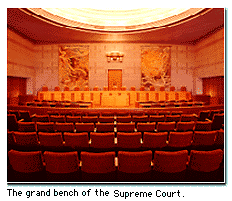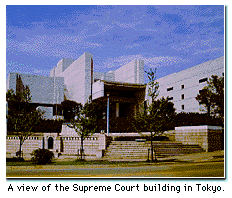 Japanese courts do not use an American-style jury system. In order to ensure that verdicts are impartial, the courts are independent of national institutions. Justices base their verdicts on the Constitution, the country's laws, and their own judgment; they receive no directions from third parties. If a judge commits a misdemeanor, they can be examined and, if found guilty, dismissed from their post by Diet impeachment. Supreme Court justices are appointed by the cabinet, and his or her competence can be put to a national vote. Japanese courts do not use an American-style jury system. In order to ensure that verdicts are impartial, the courts are independent of national institutions. Justices base their verdicts on the Constitution, the country's laws, and their own judgment; they receive no directions from third parties. If a judge commits a misdemeanor, they can be examined and, if found guilty, dismissed from their post by Diet impeachment. Supreme Court justices are appointed by the cabinet, and his or her competence can be put to a national vote.
There are five types of courts. The Supreme Court, the highest body, is in Tokyo. There are eight High Courts nationwide. Many cases are first brought before the District Courts, of which there are 50. The Summary Courts handle traffic violations and other petty offenses, and the Family Courts mediate in family disputes and handle juvenile delinquents. To safeguard fundamental rights, people may appeal verdicts up to two times to a higher court.
Photos courtesy of Supreme Court.
|


 The courts conduct proceedings under the law of the nation to safeguard people's freedom and equality and other fundamental rights and to maintain the social order. The courts also have the power to judge whether a law or the actions of an administrative body are in accordance with the Constitution; the Supreme Court has the authority to make a final ruling in such cases.
The courts conduct proceedings under the law of the nation to safeguard people's freedom and equality and other fundamental rights and to maintain the social order. The courts also have the power to judge whether a law or the actions of an administrative body are in accordance with the Constitution; the Supreme Court has the authority to make a final ruling in such cases. Japanese courts do not use an American-style jury system. In order to ensure that verdicts are impartial, the courts are independent of national institutions. Justices base their verdicts on the Constitution, the country's laws, and their own judgment; they receive no directions from third parties. If a judge commits a misdemeanor, they can be examined and, if found guilty, dismissed from their post by Diet impeachment. Supreme Court justices are appointed by the cabinet, and his or her competence can be put to a national vote.
Japanese courts do not use an American-style jury system. In order to ensure that verdicts are impartial, the courts are independent of national institutions. Justices base their verdicts on the Constitution, the country's laws, and their own judgment; they receive no directions from third parties. If a judge commits a misdemeanor, they can be examined and, if found guilty, dismissed from their post by Diet impeachment. Supreme Court justices are appointed by the cabinet, and his or her competence can be put to a national vote.
